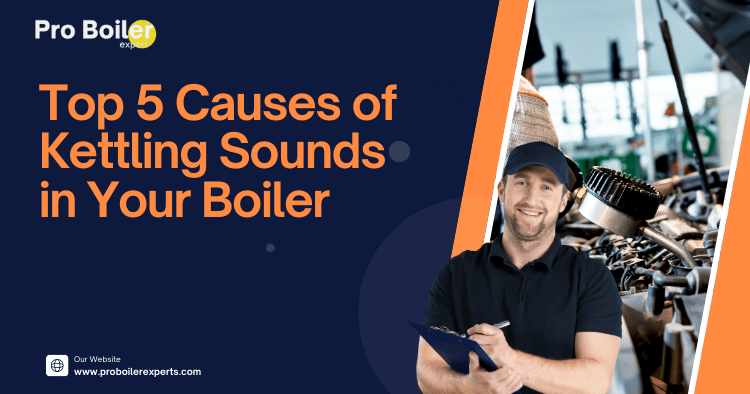Table of Contents
- What is Kettling?
- Cause 1: Limescale Buildup
- Cause 2: Low Water Levels
- Cause 3: Faulty Pump
- Cause 4: Air Trapped in the System
- Cause 5: Corroded Pipes
- Conclusion
What is Kettling?
If you’ve ever noticed your boiler making noises reminiscent of a kettle boiling, you’re encountering what is commonly referred to as “kettling.” This phenomenon occurs due to vibrations and steam bubbles forming within the system. While occasional sounds can be normal, persistent kettling can indicate underlying issues that might require immediate attention. Understanding the root causes of kettling sounds can help you maintain your boiler effectively and avoid costly repairs.
“An ounce of prevention is worth a pound of cure.” — Benjamin Franklin
Cause 1: Limescale Buildup
One of the most common causes of kettling sounds is the accumulation of limescale within your boiler. Limescale is a hard, chalky deposit that forms when hard water is heated, leading to mineral buildup in the heat exchanger. This buildup restricts water flow and traps heat, causing water to boil and produce steam bubbles that create those distinctive kettling noises.
How to Address Limescale Buildup:
- Descaling Agents: Use a descaling product specifically designed for boilers. Regular descaling can prevent limescale buildup.
- Water Softeners: Consider installing a water softener to reduce the hardness of your water.
- Regular Maintenance: Schedule annual servicing with a qualified engineer to ensure your boiler is functioning optimally. For more information, check out the Top 5 Benefits of Condensing Boilers You Should Know.
“Regular maintenance is the key to longevity.”
Cause 2: Low Water Levels
Low water levels in your boiler can lead to kettling sounds as the water that’s left is forced to heat up rapidly. When the water level drops, the heat exchanger can become exposed, causing the remaining water to boil excessively. This can create steam pockets that lead to the characteristic kettling noise.
Preventing Low Water Levels:
- Regular Checks: Regularly check the pressure gauge; it should be between 1 and 1.5 bar. If it dips below this range, it’s time to top up the system.
- Leak Detection: Look for leaks in your system that might be causing pressure drops.
For detailed guidance on maintaining proper water levels, refer to the Top 5 Tips for Choosing the Right Boiler Installer.
“An empty kettle makes the loudest noise.” — Malcolm X
Cause 3: Faulty Pump
The pump in your boiler is responsible for circulating water throughout the system. If this pump is malfunctioning or has become obstructed, it can lead to poor water circulation. Inadequate circulation can cause localized overheating, which in turn creates steam bubbles and kettling sounds.
Signs of a Faulty Pump:
- Unusual noises from the boiler
- Inconsistent heating throughout your home
- Visible leaks around the pump
Solutions:
- Inspection: Have a qualified engineer inspect the pump for blockages or wear.
- Replacement: If the pump is faulty, it may need to be replaced to restore proper functionality.
For more on pump maintenance, visit the Essential Pre-Installation Checklist for Your New Boiler.
“Prevention is better than cure.” — Desiderius Erasmus
Cause 4: Air Trapped in the System
Air trapped in your heating system can cause kettling sounds as it disrupts the normal flow of water. When air bubbles form, they can cause the water to heat unevenly, leading to rapid boiling in certain areas of the system.
How to Remove Trapped Air:
- Bleed Radiators: Use a radiator key to bleed your radiators, releasing trapped air. This should be done regularly, especially if you notice cold spots on your radiators.
- Professional Help: If you’re unsure how to bleed your radiators or if the problem persists, consult a heating engineer.
For step-by-step instructions on bleeding radiators, check out the Essential Steps for Testing Your Boiler Installation.
“Clear the air to let the warmth flow.”
Cause 5: Corroded Pipes
Corrosion in your boiler’s pipes can also cause kettling sounds. Over time, rust and debris can accumulate, leading to blockages that force water to boil and create steam bubbles. This not only causes noise but can also lead to significant damage if left untreated.
Preventing Corrosion:
- Regular Inspections: Schedule regular inspections of your boiler and pipes for signs of wear or corrosion.
- Chemical Treatments: Consider using a chemical inhibitor to prevent corrosion and sludge buildup in your system.
For more information on corrosion prevention, refer to the Top 5 Benefits of Biomass Boilers for Eco-Friendly Heating.
“An ounce of prevention is worth a pound of cure.” — Benjamin Franklin
Conclusion
Kettling sounds in your boiler may seem innocuous at first, but they can indicate more significant issues that need addressing. From limescale buildup to faulty pumps and corroded pipes, understanding the causes can help you take proactive measures to maintain your heating system. If you’re experiencing persistent kettling, don’t hesitate to reach out to a professional for a thorough inspection and repair. Your comfort and safety are worth it!
“Stay warm and proactive!”
By exploring these common causes and their remedies, you can ensure your boiler operates efficiently, saving you money and keeping your home warm. If you have any questions or need further assistance, feel free to reach out!




